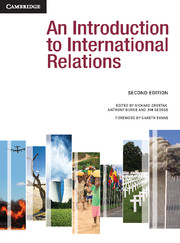Book contents
- Frontmatter
- Contents
- Tables, Figures and Boxes
- Contributors
- Preface and acknowledgements
- An Introduction to International Relations: The origins and changing agendas of a discipline
- 1 Theories of International Relations
- 2 The Traditional Agenda
- 3 The New Agenda
- 21 The United Nations
- 22 Non-State Actors: Multinational Corporations and International Non-Governmental Organisations
- 23 Religion and Secularism
- 24 Global Economic Institutions
- 25 Global Trade
- 26 Global Finance
- 27 Global Poverty, Inequality and Development
- 28 Globalisation and Its Critics
- 29 Global Terrorism
- 30 Post-Conflict State-Building
- 31 Humanitarian Intervention
- 32 Human Rights
- 33 Migration and Refugees
- 34 Global Environmental Politics
- 35 Climate Change
- Glossary of Terms
- Bibliography
- Index
- References
30 - Post-Conflict State-Building
from 3 - The New Agenda
- Frontmatter
- Contents
- Tables, Figures and Boxes
- Contributors
- Preface and acknowledgements
- An Introduction to International Relations: The origins and changing agendas of a discipline
- 1 Theories of International Relations
- 2 The Traditional Agenda
- 3 The New Agenda
- 21 The United Nations
- 22 Non-State Actors: Multinational Corporations and International Non-Governmental Organisations
- 23 Religion and Secularism
- 24 Global Economic Institutions
- 25 Global Trade
- 26 Global Finance
- 27 Global Poverty, Inequality and Development
- 28 Globalisation and Its Critics
- 29 Global Terrorism
- 30 Post-Conflict State-Building
- 31 Humanitarian Intervention
- 32 Human Rights
- 33 Migration and Refugees
- 34 Global Environmental Politics
- 35 Climate Change
- Glossary of Terms
- Bibliography
- Index
- References
Summary
Introduction
This chapter introduces students to the current post-conflict state-building agenda. Identifying the end of the Cold War (see Chapter 20), the rise of the discourse of humanitarian intervention (see Chapter 31) and the events of September 11 (see Chapter 29) as key to the development of this agenda, the chapter canvasses the main areas of contention and debate in this field. It seeks to highlight the debates over the political content of post conflict state-building, with critics tackling the notion from a number of different perspectives. The chapter closes with a brief consideration of the impacts of the current post conflict state-building agenda and asks where that agenda might head from here.
The rise of post-conflict state-building
Roland Paris (2003: 451) recently argued that ‘there is no logical requirement for international agencies to resurrect failed states as states, rather than allowing war-torn regions to develop into some other kind of polity’. Paris’s argument provocatively suggests that current demands to rebuild the state as the apparently automatic response in post-conflict situations may not be the ideal answer to the difficulties at hand. Yet state-building remains the predominant response of the international community when attempting to address the various problems that arise in post-conflict situations.
- Type
- Chapter
- Information
- An Introduction to International Relations , pp. 414 - 425Publisher: Cambridge University PressPrint publication year: 2011

